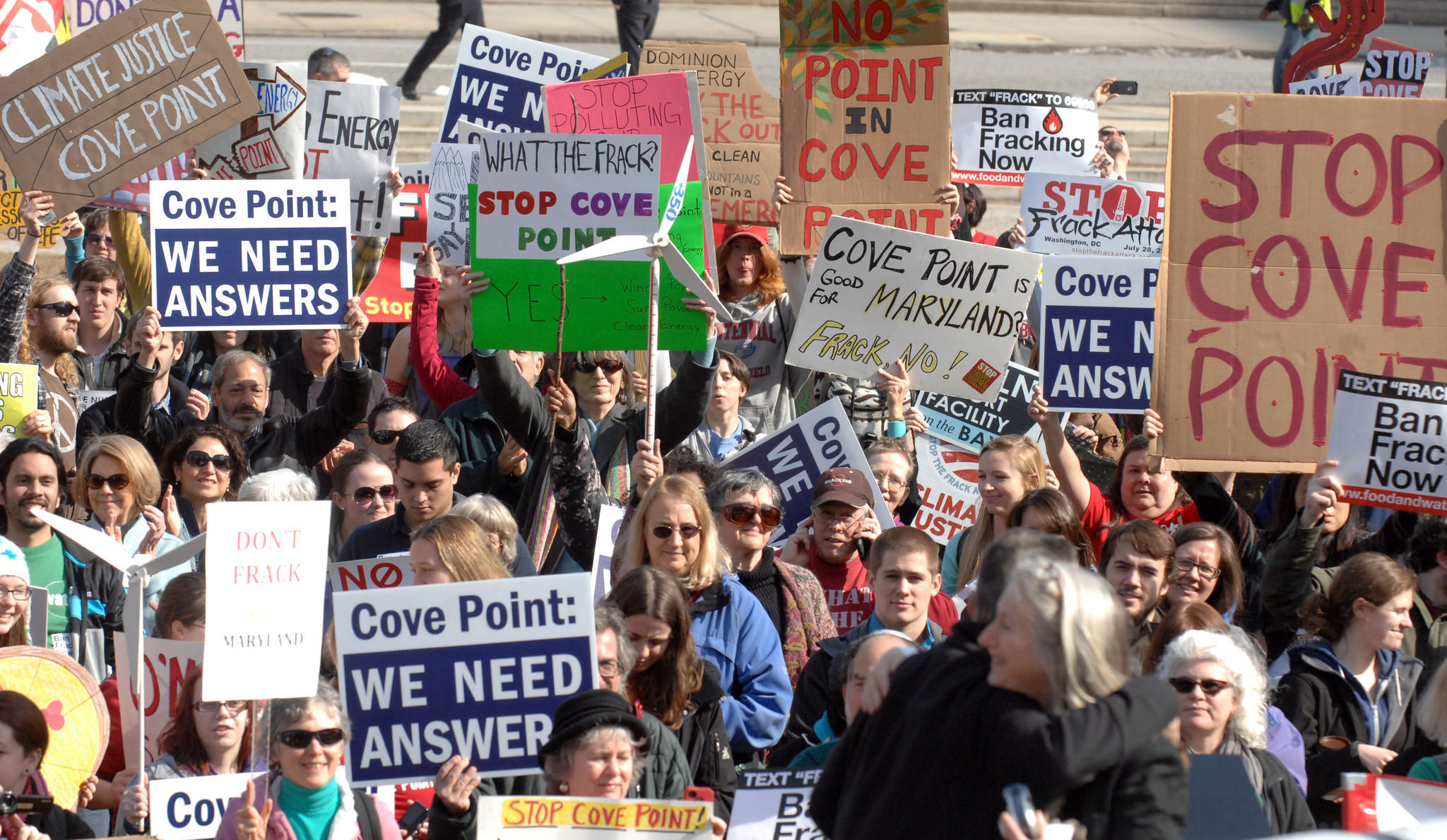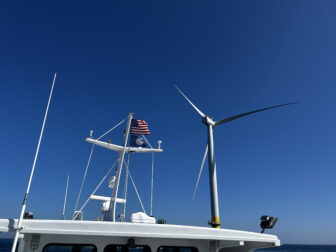The Baltimore Sun
By Jamie Smith Hopkins
An estimated 500 people rallied Thursday in Baltimore against plans to export liquefied natural gas from a Southern Maryland facility, chanting and carrying signs past the office tower where state regulators were considering one aspect of that proposal.
The authority to approve or reject the project lies with the Federal Energy Regulatory Commission. But Maryland’s Public Service Commission has the say over a 130-megawatt power plant that energy company Dominion says it needs for the export operation.
The proposal has drawn powerful support — including from Rep. Steny Hoyer, a Southern Maryland Democrat — as well as opposition from the Sierra Club and other groups, largely on environmental grounds. Both sides used this week’s hearings as an opportunity to get their message out.
Dominion, which owns the Cove Point complex, held a news conference Wednesday with supporters, including a construction union official and a Maryland manufacturer. They characterized the project as an economic boon and said exporting natural gas to replace coal would help the environment.
The rally against the project drew people from across the state — many opposed to a controversial technique known as “fracking” used to extract natural gas — and temporarily closed streets in downtown Baltimore at lunchtime. Speakers included Del. Heather Mizeur, a Democrat who is running for governor.
“I’ve been doing this for 12 years,” said Mike Tidwell, executive director of Chesapeake Climate Action Network, which helped organize Thursday’s event and estimated the crowd at about 700. “I’ve never been at an environmental rally … this big.”
A police spokesman could not provide a crowd estimate Thursday. Dominion spokesman Chet Wade said it counted fewer than 300 people.
Opponents contend that exporting natural gas from Cove Point would increase demand for hydraulic fracturing, a method of extracting the gas that environmentalists say pollutes groundwater and air but that the industry says is safe.
Dominion officials said the project should not be seen as a “proxy” for fracking, including whether to allow the method in Maryland. Cove Point exports could come from as far afield as the Gulf Coast through the country’s network of pipelines, said Pamela F. Faggert, the company’s chief environmental officer.
“Nor would stopping the Cove Point project likely reduce fracking elsewhere,” Faggert said. “Cove Point exports would account for only a small sliver of the gas that could be produced in the United States. Without Cove Point, the only question is where the natural gas would go instead.”
That argument didn’t fly with rally participants. Paul Roberts, who runs a winery in Western Maryland and sits on the state commission studying fracking, said he’s concerned the state will be under far more pressure to allow the technique if natural gas interests can export from Cove Point.
“It would be very terrible if all the work we’ve put in is undermined,” Roberts said.
Cove Point is an import facility for liquefied natural gas. The market for bringing that product into the country has dwindled as fracking fueled a natural gas boom in the U.S.
Expanding Dominion’s Calvert County complex to allow exporting would cost as much as $3.8 billion. The company would pay an additional $40 million in annual property taxes for five years, then receive a tax break of 42 percent for nine years.
Drew Greenblatt, president of Marlin Steel Wire Products, a Baltimore manufacturer, is among those who spoke in favor of Cove Point at Dominion’s news conference.
“A thriving natural gas industry, one with access to all potential markets, including overseas markets … will mean more demand for our products in America,” he said. “We should take advantage of it, and we’re very lucky that this has happened to our state.”
Hearings in the Public Service Commission case began Thursday. A hearing for public comment is scheduled for March 1 at Patuxent High School in Lusby, near Cove Point.
The agency must make a decision on the power plant by May 30. The FERC has not set a timeline for a decision, Dominion said.
The early hours of Thursday’s hearing revolved around the project’s impact. Sierra Club attorney Joshua Berman, highlighting reports suggesting that exporting would cause domestic natural gas prices to rise and promote the use of coal, asked a Dominion executive whether he agreed with those conclusions.
Michael D. Frederick, vice president of LNG operations at Cove Point, said the U.S. Department of Energy — which gave Cove Point its OK to export — is charged with ensuring that the move is in the country’s interests.






